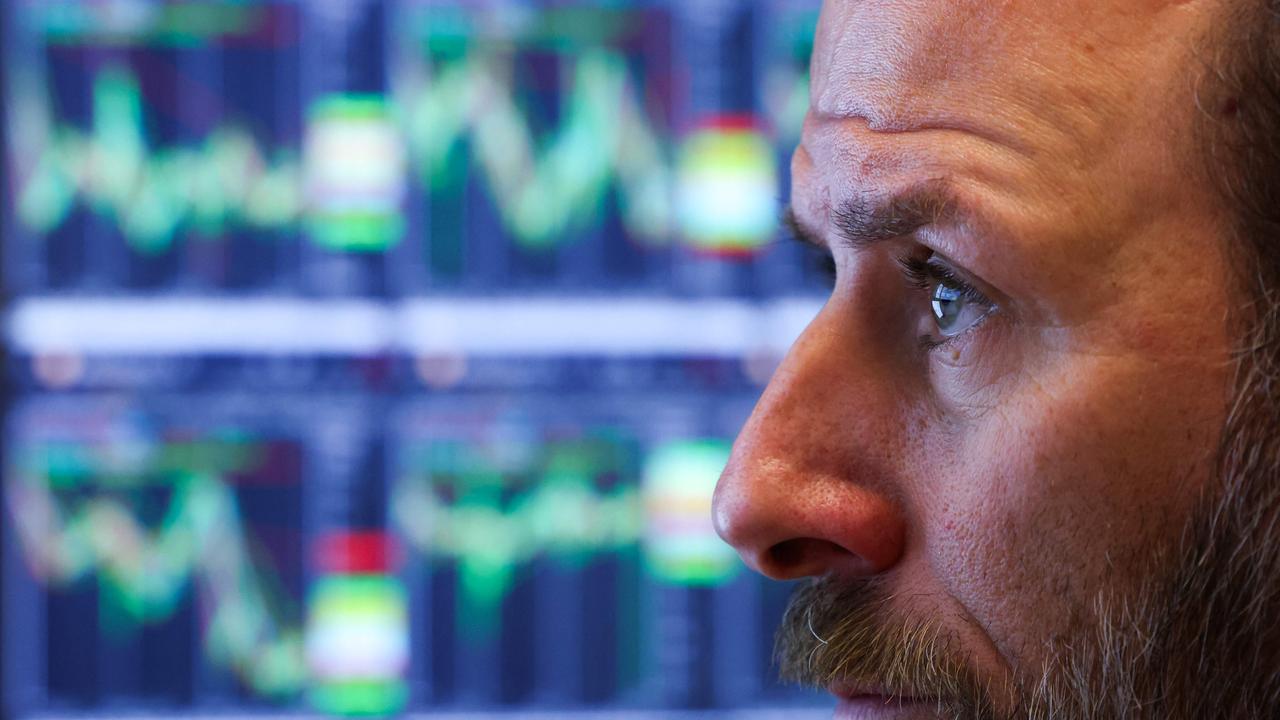Australian dollar, shares lift after Scott Morrison wins election for Coalition
The ‘Scott Morrison effect’ sent the Australian stockmarket skyrocketing on Monday with shares gaining $33 billion in value to hit an 11-year high. The benchmark ASX200 share index closed 1.7 per cent higher to reach 6476.1 points.

Markets
Don't miss out on the headlines from Markets. Followed categories will be added to My News.
The “Scott Morrison effect” has sent the Australian stockmarket skyrocketing, with shares gaining $33 billion in value on Monday to hit an 11-year high.
The Prime Minister’s surprise election win over the weekend has proven to be a huge relief for investors who began furiously pouring money back into Australian stocks.
The benchmark ASX200 share index closed 1.7 per cent higher on Monday to reach 6476.1 points, its highest level since December 2007.
It marked the largest post-election gain for the stockmarket since Kevin Rudd was elected in 2007 and the second-largest since Bob Hawke came to power in 1983.
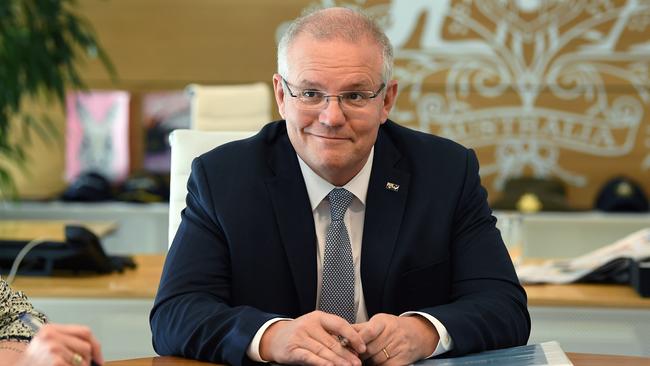
MORE NEWS
How opinion polls got it so wrong
Why everyone loves ScoMo’s wife
PM to win majority government, takes Wentworth back
Banks, private health insurers and hospital operators experienced the biggest gains after investors realised Labor’s bold policies affecting those industries had no chance of being implemented.
“It’s entirely the Scott Morrison effect, it really is a relief rally, the US market is down and the Australian market has gone in exactly the opposite direction and strengthened,” independent economist Clifford Bennett said.
“This will spread into other stocks in coming days, so it’s just the standout stocks today, but I think you can expect to see this effect spread to the entire market.”
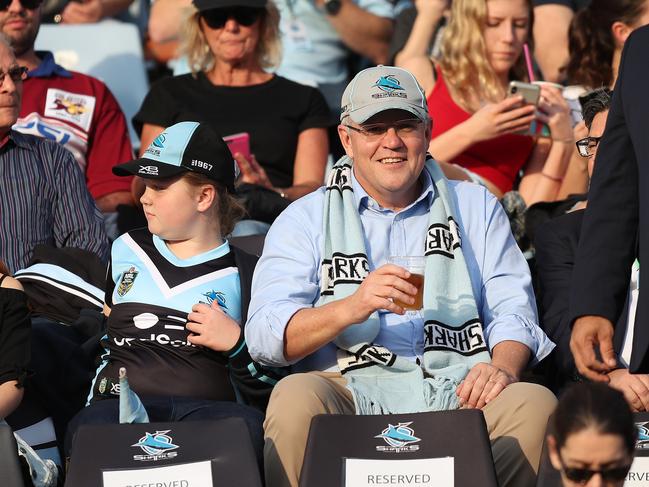
CMC Markets chief market analyst Michael McCarthy said Labor’s proposed changes to franking credits and negative gearing had become a huge concern for investors, along with the proposed move to cap health insurance premiums.
“The banks are among the biggest payers of franked dividends so that hurt … and the potential changes to negative gearing were a real concern,” he said.
“The probability that that would decrease demand for borrowing and potentially bring down house prices was a potential double hit to banks’ bottom lines.”
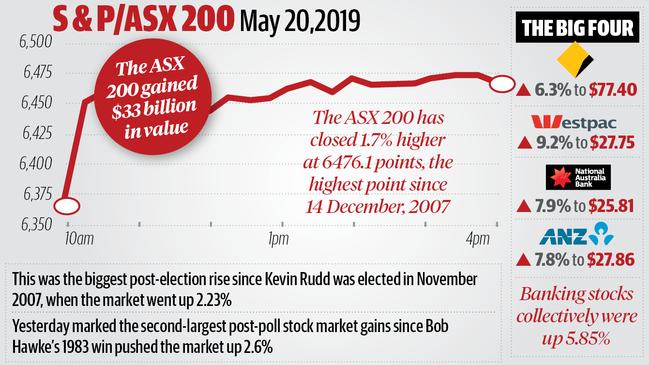
RELATED NEWS
Turnbull congratulates Morrison, takes subtle swipe at Dutton
Gallery: The long faces of Labor’s loss
Shock as Tanya Plibersek pulls out of leadership race
Mr McCarthy said with these policies now off the table the market responded by surging, with Australian shares having their strongest single day of gains since December 27 last year.
“It’s not often we see some of Australia’s largest stocks going up almost 8 per cent plus in a single trading session.
“Medical insurers are seen as real beneficiaries out of this, the proposed Labor policy to cap premium increases concerned a lot of people in the medical industry.
“That would mean for the insurers a squeeze from both sides, increasing costs on one side in terms of their payouts and then the inability to cover that by increasing premiums.”
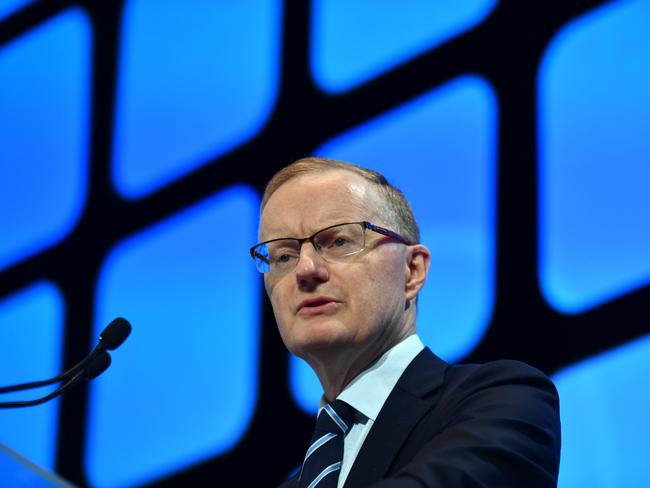
CommSec chief economist Craig James said Mr Morrison’s win had also increased the value of the Aussie dollar, which rose from 68.89 US cents on Friday to 69.18 US cents on Monday afternoon.
“Investors won’t need to work through the consequences of the Labor Party’s proposed changes to negative gearing, franking credits and taxation scales,” he said.
Mr Bennett said Labor had been “far too extreme” with its policies, which ended up punishing them on election day.
“We now have a stable and re-energised Coalition government, and for the first time a clear and strong leader,” he said.
“I expect to see further new highs (on the stock market) this week and in the weeks to come … so I think the outlook is extremely positive.”
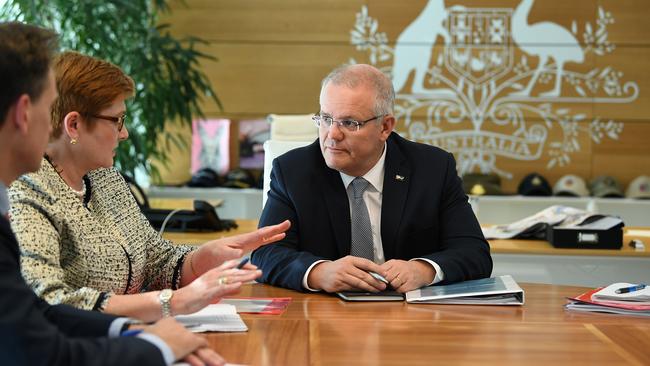
Debt ratings agency Moody’s said the Australian election result would have “limited implications” for Australia’s credit outlook.
“Past Coalition and Labor governments have both shown broad commitment to fiscal consolidation, the current monetary policy framework, and economic reform,” senior credit officer, sovereign risk group at Moody’s Investors Service Martin Petch said.
“Australia’s underlying economic and institutional strengths continue to support the country’s credit profile. However, the potential impact of fragmented representation in the Senate on policy making, exposure to high external liabilities, and high levels of household debt remain important credit challenges.”
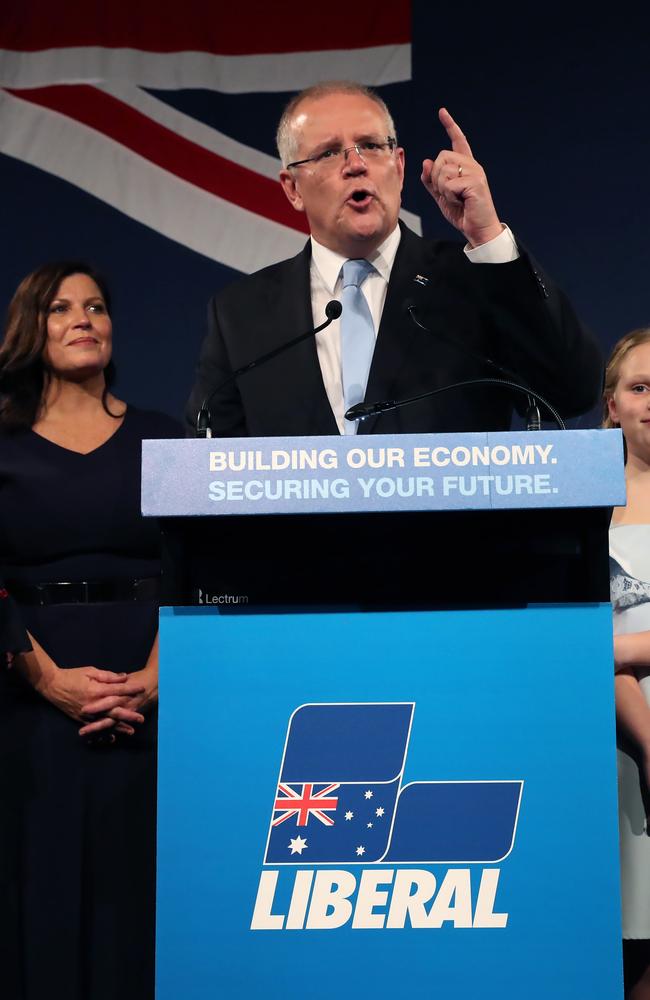
Experts say the Australian economy could now surge ahead slightly faster than expected, which will factor into the Reserve Bank of Australia’s interest rate decision next month. “The question is whether the Reserve Bank waits for the ‘natural’ lifting of economic activity post-election or whether it believes that an extra kick along is required,” Mr James said.
Across the major bank shares on Monday, Westpac was up 9.2 per cent to $27.75, NAB gained 7.9 per cent to $25.81, ANZ increased 7.8 per cent to $27.86 and Commonwealth Bank gained 6.3 per cent to reach $77.40.
Private health insurers and hospital operators also soared, with NIB up 15.79 per cent to $6.82, Medibank up 11.5 per cent to $3.21.
ON THE ASX:
* The benchmark S&P/ASX200 index was up 110.8 points, or 1.74 per cent, to 6.476.1 points at 4.30pm AEST on Monday.
* The All Ordinaries was up 104.5 points, or 1.62 per cent, to 6,564.7.
* At 4.30pm AEST, the SPI200 futures index was flat at 6485.
One Australian dollar buys:
* 69.26 US cents, from 68.89 US cents on Friday
* 76.29 Japanese yen, from 75.51 yen
* 62.09 euro cents, from 61.60 euro cents
* 54.41 British pence, from 53.87 pence
* 105.90 NZ cents, from 105.27 cents
Originally published as Australian dollar, shares lift after Scott Morrison wins election for Coalition

